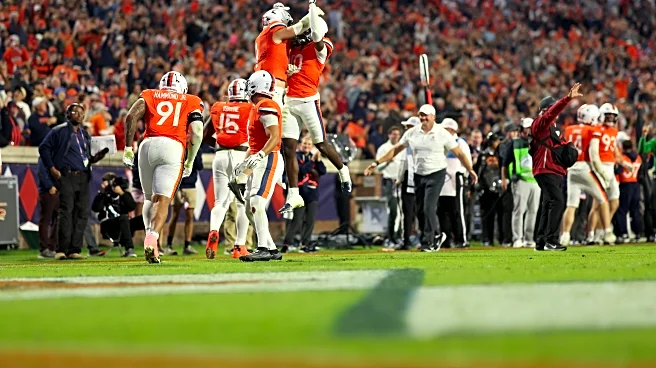Constant change and chaos surround the modern era of college football in 2025, and it continues to come from every direction – whether it be the ever-changing transfer portal rules, talks of playoff expansion,
or the now national budget-measuring competition when it comes to coaching buyouts. And, while you can be sure any drama stemming from each of those three won’t go away anytime soon, there’s a staple of this great sport that is now under attack, according to the worldwide leader’s College Football Playoff Predictor.
Conference championship games.
Last December. the CFP selection committee was tasked with a seismic decision when faced with choosing between a conference title game runner-up in SMU, who lost to Clemson on a game-winning field goal in Charlotte, or a three-loss, non-SEC championship playing Alabama team.
If the committee had selected the Crimson Tide after ranking that SMU team as ‘In’ prior to that championship bout with Clemson, the precedent would then be on the books that reaching a conference title game (which means a team has to be good at football and win lots of football games) and losing would be seen as worse than sitting idle at home (because said team lost too many football games) on conference championship Saturday.
Such a decision would have surely spawned the idea that teams are better off declining a chance to play in their conference’s title games if just barely on the positive side of the cut line for the CFP, for fear of dropping out with a loss or even diminishing top teams’ chances at a bye — the nuclear scenario for any college football purist.
That idea sounds somewhat crazy when you first think about it, no way teams would really sit out games, right? We also thought we’d never see players be paid or opt out in the middle of seasons, too. It’s not out of the realm of possibility, especially given the added wear and tear on rosters with the 12-team playoff format and coaches desperately wanting their guys fresh for the stretch run.
And, while that SMU precedent was set that teams shouldn’t be discredited for making a title game and coming up short in a competitive fight, ESPN’s analytics have ignored that when projecting how the field will take shape this season.
That brings us to the present, where, as of October 19th, 24 teams are included on the predictor, including the ‘Hoos, who have a 14% chance to reach the CFP, per ESPN’s Football Power Index. The predictor allows you to choose the outcomes of each of the three toughest remaining games for each of these 24 teams, assuming every other game is a win for the team you choose.
So, if you punch in wins for each of UVA’s three toughest remaining games, which are against Cal, Wake Forest, and Duke, you’re then asked whether or not UVA would win the ACC championship, lose it, or not make the game at all. This is where things start to get ridiculous.
The predictor says if the ’Hoos were not to make the title game (disregard the fact that UVA controls its own destiny to get there, barring unlikely tiebreakers), they would have a 16% chance to make the CFP. Sounds reasonable enough.
But if Tony Elliott’s team were to make it and lose, say to a good Miami or Georgia Tech team, for example? A less than one chance of making the field. In what world does it make sense to reward a program for potentially not playing in a title game and penalize one that does? To me, that violates the most foundational rule of sport — you play to win, and in this case, winning punches you a ticket to Arlington, Atlanta, Charlotte, Indianapolis, or wherever else title games are played nowadays. That should mean something.
And you’re probably thinking ‘Oh that’s probably just in UVA’s case,’ that was my first thought as well. But it’s about as true as Virginia Tech’s athletic department’s promise to raise $120 million.
Of the 24 teams listed, eight don’t allow the possibility to see how the numbers differ, given that if any one team out of Alabama, BYU, Texas A&M, Ohio State, Indiana, and South Florida among others were to run the table, they would automatically make their respective title games, thus no way to know what the numbers look like if they were to not make their respective championships.
That knocks the pool of teams down to 16. And, of those teams, 15 have better odds to either make the CFP, receive a first-round bye, or, in numerous cases, both by not appearing in a conference title game. North Texas is the lone squad to not fit the trend, with its chances for a bid being less than 1% regardless of whether or not the Mean Green make the American title game.
Will there be a time in the future when selection committee decisions severely impact, if not completely gut, how conference championship games are treated? Unfortunately, the answer is likely going to be a yes at some point; if anything, I think it’s trending more towards inevitability with how much uproar there was last season over Alabama’s exclusion.
The first week of December has long been one of the best stretches of any college football season, and promoting the importance of playing in those games should remain. For the good of the sport, the committee better not devalue these games — even if ESPN already has.









